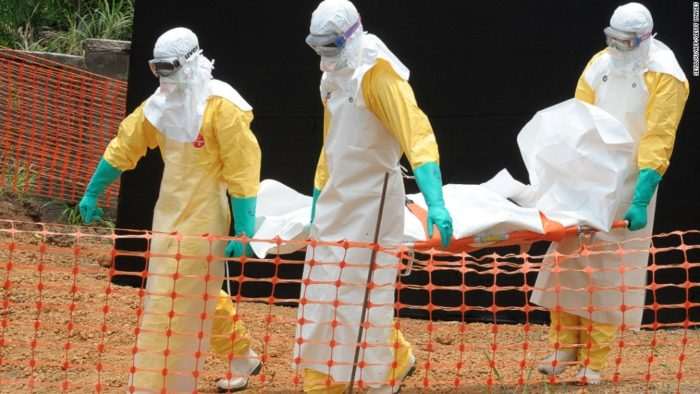The death toll in the latest outbreak of Ebola in the Democratic Republic of the Congo has risen to 1,540, according to the World Health Organisation (WHO).

In an update on Friday, the world health body said 2,284 people had been infected since the outbreak in the country’s Ituri and North Kivu provinces nearly 11 months ago.
However, vital work of tracing people infected with the deadly virus is progressing, in spite of evidence of “several” massacres in the affected area earlier this month, the organisation said.
In spite of the insecurity, WHO insisted that frontline workers were doing all they could to tackle Ebola in North-east DRC.
“We had 637 people who survived the disease, and I think this is important,” Dr Ibrahima Fall, WHO Assistant Director-General for Emergency Response, told newsmen in Geneva, according to a statement.
He noted that around 90 people were currently receiving treatment for Ebola virus disease infection, while new cases had dropped from 106 two weeks ago, to 79 last week.
At the same time, the UN human rights office, OHCHR, announced that a “robust” probe found that 117 people had been killed in “several massacres” involving multiple villages in gold-rich Ituri, between June 10 and June 13.
“The investigative team confirmed that at least 94 people had been killed in Djugu territory and 23 in Mahagi territory, including a yet to be undetermined number of women and children.
“Some of the victims were beheaded. Homes and warehouses were burned down after being looted.
“The ferocity and scorched-earth nature of the attacks suggests the assailants intended to prevent survivors from being able to return to their villages,” OHCHR spokesperson, Marta Hurtado, said.
Hurtado was quoted as saying that most of the victims belonged to the Hema community, while the remaining ones were Alur people.
She added that the attackers were reportedly from the Lendu community, echoing an earlier alert from the UN refugee agency, UNHCR.
UNHCR had earlier reported that thousands of people displaced by violence had arrived in Uganda this month, with an average of 311 people crossing the border daily, double the number for May.
Fall explained that major urban centres of Butembo and Katwa were now seeing only “sporadic” cases of infection, thanks to full access.
He, however, cautioned that in Beni, a large town in North Kivu, Ebola had claimed nine lives since Monday.
Contact tracing there and other preventative work was slowed earlier this week amid attacks by taxi drivers who were upset about the death of a colleague who sought help too late, according to him.
Turning to remote areas, Fall confirmed that the “very volatile” security situation had complicated the WHO’s work to tackle “a new hotspot” in Mabalako and Mandima.
“The outbreak started there last year and spread to other regions, so it’s important to break the vicious cycle, to contain very quickly the situation in Mabalako and Mandima, where we have more than 55 per cent of the cases coming from.”
He said for the first time in the current outbreak, Ebola had also reached small forest-based villages such as Alima, where access is “more challenging”.
Fall blamed the situation on the presence of armed groups from DRC and neighbouring Uganda.
“You cannot just say, ‘I have access, I can go.’ You have to negotiate; you have to assess conscious that the risk is still important.
“This is because as you know, with Ebola, you only need one case to start spreading or one high-risk contact not followed transfers the disease,’’ he said.
Asked about the infection threat in Uganda, where three people with Ebola died earlier this month after arriving from DRC, the WHO official insisted “there has been no transmission” of the virus.
(NAN)

